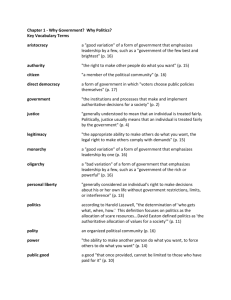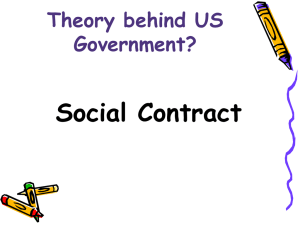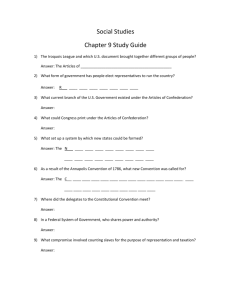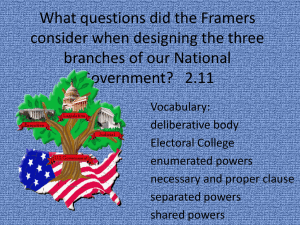Chapter 1 - Why Government? Why Politics? Key Vocabulary Terms
advertisement
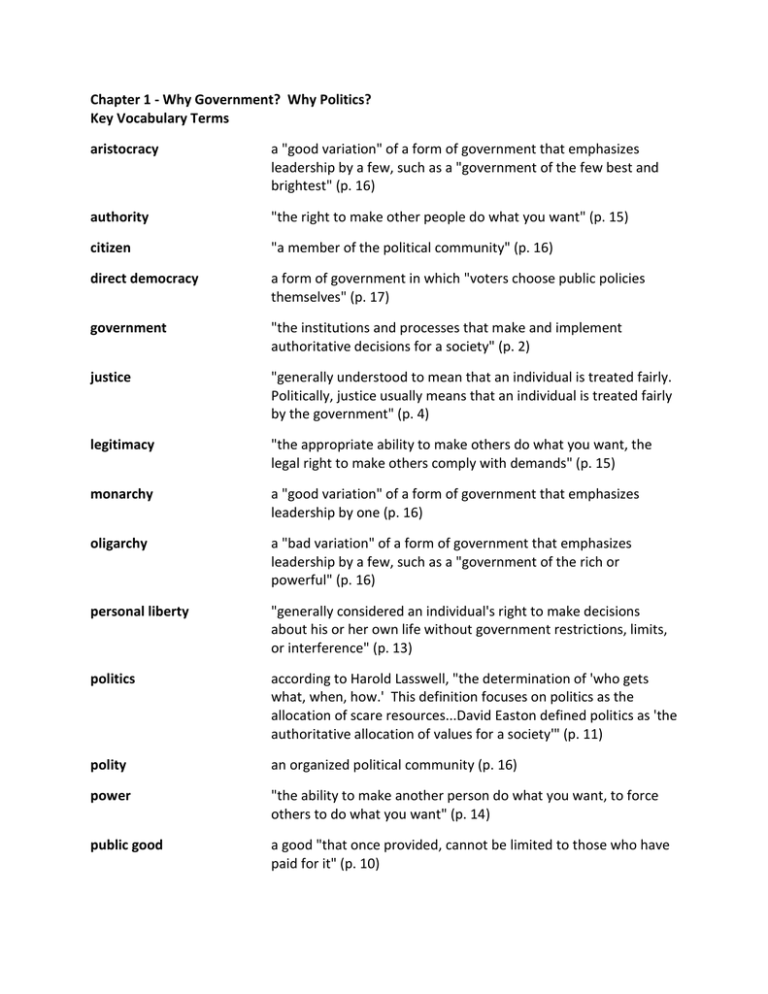
Chapter 1 - Why Government? Why Politics? Key Vocabulary Terms aristocracy a "good variation" of a form of government that emphasizes leadership by a few, such as a "government of the few best and brightest" (p. 16) authority "the right to make other people do what you want" (p. 15) citizen "a member of the political community" (p. 16) direct democracy a form of government in which "voters choose public policies themselves" (p. 17) government "the institutions and processes that make and implement authoritative decisions for a society" (p. 2) justice "generally understood to mean that an individual is treated fairly. Politically, justice usually means that an individual is treated fairly by the government" (p. 4) legitimacy "the appropriate ability to make others do what you want, the legal right to make others comply with demands" (p. 15) monarchy a "good variation" of a form of government that emphasizes leadership by one (p. 16) oligarchy a "bad variation" of a form of government that emphasizes leadership by a few, such as a "government of the rich or powerful" (p. 16) personal liberty "generally considered an individual's right to make decisions about his or her own life without government restrictions, limits, or interference" (p. 13) politics according to Harold Lasswell, "the determination of 'who gets what, when, how.' This definition focuses on politics as the allocation of scare resources...David Easton defined politics as 'the authoritative allocation of values for a society'" (p. 11) polity an organized political community (p. 16) power "the ability to make another person do what you want, to force others to do what you want" (p. 14) public good a good "that once provided, cannot be limited to those who have paid for it" (p. 10) representative democracy (republic) a form of government in which "individuals do not directly govern themselves. Voters elect representatives who, as government officials, make laws for the people" (p. 17) social contract theory "people create governments by entering into written or unwritten agreements to live together under a particular form of government" (p. 7) tyranny a "bad variation" of a form of government that emphasizes leadership by one (p. 16) Chapter 2 - The U.S. Constitutional Government Key Vocabulary Terms Bill of Rights "the first ten amendments to the Constitution" (p. 39) checks and balances "a Madisonian system...designed to prevent the concentration of power in the hands of one individual or one institution" (p. 36) Coercive Acts passed by Parliament in 1774, the Coercive Acts "allowed Britain to blockade Boston Harbor and placed 4,000 more soldiers in Boston" (p. 29) confederation "political power is decentralized because the central (or national) government is weak and the state or regional governments are strong" (p. 32) constitution "a governing document that sets forth a country's basic rules of government and politics" (p. 22) federalism "a geographic division of power between the national government and the state governments" (p. 36) mercantilism "the theory that the government controls and directs economic activity, particularly foreign trade, in order to maximize the state's wealth" (p. 28) Mutiny Act this act of 1765 "forced colonists to either provide barracks for British soldiers or house them in their homes" (p. 28) republican system of government "a republic is a type of democracy. It is an indirect democracy. Elected representatives make public policy for the people. The people control government by electing government officials" (p. 36) rule of law "the principle that governmental authority is exercised only in accordance with public laws that are adopted and enforced according to established procedures" (p. 23) separation of powers "a functional division of power among the legislative, executive, and judicial branches of government" (p. 36) Seven Years War lasting from 1756-1763, "the long and expensive war with the French and Indians [that] ended with the British in control of most of North America" (p. 28) Shays' Rebellion "in the fall of 1786 and winter of 1787, Daniel Shays, a Revolutionary War veteran, lead around 1,500 supporters on an armed march to stop mortgage foreclosures...Shays and his supporters marched on the government to demand it provide them with some relief from the bad economic conditions" (p. 33) Sugar Act this act of 1764 "taxed sugar, wine, coffee, and other products commonly exported to the colonies" (p. 28) Stamp Act this act of 1765 "required all printed documents to bear a stamp" (p. 28) triangle trade a "mercantilist arrangement" where "slaves were brought to America from Africa; sugar, cotton, and tobacco were exported to England; and manufactured goods, textiles, and rum were sent to Africa to pay for slaves" (p. 28) Townshend Acts enacted by Parliament in 1767, the Townshend Acts "imposed duties on many products including tea" (p. 29) Chapter 3 - Congress Key Vocabulary Terms appropriations "the budget," controlled by the House of Representatives (p. 53) conference committees "committees [that] are created to reconcile differences between the House and Senate versions of a bill. The conference committee is made up of members from both the House and Senate who work to reach compromises between similar pieces of legislation passed by the House and the Senate" (p. 62) constituency service "helping constituents solve problems that they may have with the government" (p. 57) delegate a theory of representation that states "that members of Congress should act as instructed delegates of their constituents. According to this theory, elected representatives are not free agents: representatives have a political obligation to do what their constituents want" (p. 56) enumerated powers powers "that are specifically mentioned. Enumerated powers are sometimes called delegated powers because they are powers that the Constitution actually delegates to government" (p. 53) impeachment "the formal charging of a government official with treason, bribery, other high crimes and misdemeanors" (p. 53) implied powers powers "that are not specifically mentioned by which can be logically implied to flow from those that are enumerated" (p. 53) joint committees "committees [that] have members from the House and Senate and are concerned with specific policy areas" (p. 62) legislative oversight "Congress oversees the administration of the laws by conducting hearings to determine how public policy is being implemented, to determine whether the president is implementing the laws the way Congress intended, or to determine whether the law needs to be changed based on information about how it is working, especially whether it is working well or not" (p. 57) majority party "the party with the most seats" (p. 63) minority party "the party with the second number of seats" (p. 63) necessary and proper clause this clause in Article I, Section 8 of the Constitution "has been interpreted to mean that Congress can make 'all laws which shall be necessary and proper' to achieve its enumerated powers" (p. 54) politico a theory of representation that "suggests that representatives are rational actors whose voting behavior reflects the delegate or trustee theory of representation depending on the situation" (p. 56) President pro tempore "the official chair of the Senate, is a largely honorary position awarded to the most senior senator of the majority party" (p. 64) select or special committees "temporary committees that serve only for a very specific purpose. These committees conduct special investigations or studies and report back to whichever chamber established the committee" (p. 62) Speaker of the House "the most powerful position in the House of Representatives...which is the only leadership position in the House that is created by the Constitution. The Speaker is a member of the majority party and is elected by their party to oversee House business, interact with the Senate and the President, and is the second in line of presidential succession" (p. 64) standing committees "the permanent committees that focus on specific areas of legislation" (p. 62) trustee a theory of representation that states "that members of Congress should do what they think is in the best interest of their constituents. According to this theory, elected representatives are free agents: they can vote according to what they think is right or best regardless of public opinion in the district" (p. 56) Chapter 4 - The Presidency Key Vocabulary Terms delegated powers also known as the enumerated powers, these powers "are actually mentioned or enumerated in the Constitution in Article II" (p. 75) Electoral College the mechanism through which the president and vice president are elected. After the general election, each state's slate of electors meet to choose the president and vice president. Each state has a number of electoral votes equal to the number of U.S. House Representatives and U.S. Senators that represent them in Congress (p. 87-89) imperial presidency a term "used to refer to presidents who are too strong, too powerful for our own good" (p. 72) implied powers powers "that are not actually mentioned in the Constitution, but which are logically related to them" (p. 75) primary election "an election to determine who will be the political party's candidate for office" (p. 86) rule of law "the principle that governmental authority is legitimately exercised only in accordance with written, publicly disclosed laws adopted and enforced in accordance with established procedure" (p. 71) Chapter 5 - The Judiciary Key Vocabulary Terms dispute resolution this "function of courts is to settle disputes according to law. This is a universal function associated with courts" (p. 106) judicial activism "a belief that it is appropriate for courts to play a broad role in the government, that judges should be willing to enforce their view of what the law means regardless of political opposition in the legislative or executive branches" (p. 105) judicial restraint "a belief that it is appropriate for courts to play a limited role in the government, that judges should be very hesitant to overturn decisions of the political branches of government, and that judges should wherever possible defter to legislative and executive actions" (p. 105) judicial review "the power of the courts to review the actions of government officials to determine whether they are constitutional" (p. 103) law interpretation "deciding what the law means when there is a disagreement about what a law means, conflicting provisions of a law, or even conflicts between two laws" (p. 107) legitimacy "an issue throughout the nation's history. The problem is that in democratic political systems there is a preference for policy making by elected government officials but federal judges are appointed to life terms. This makes the federal judiciary an undemocratic government institution" (p. 96) precedent "a legal system where judges are expected to use past decisions as guides when deciding issues that are before the court" (p. 105) Chapter 6 - Federalism Key Vocabulary Terms confederation also known as a confederal system, it "is a political system where the constituent units (the states, provinces, or regional governments) are more powerful than the central (or national) government. Power is decentralized. The central government is comparatively weak, with fewer powers and governing responsibilities than the units" (p. 123) Cooley Doctrine developed by the Supreme Court "to decide whether a matter was for local or national regulation. According to the Cooley Doctrine, subjects that are 'in their nature national, or admit only of one uniform system, or plan of regulation, may justly be said to...require exclusive legislation by Congress.' Subjects that are not national and require local diversity of regulation are left to the states" (p. 131) cooperative federalism "describes the national and state governments as sharing power over areas of public policy" (p. 132) delegated powers "Article I, Section 8 of the Constitution lists powers granted to Congress. The list of powers delegated to Congress includes the power to coin money, tax, regulate interstate commerce, and raise and support armies" (p. 125) dual federalism "a theory of federalism that describes both the federal government and the state governments as co-equal sovereigns" (p. 131) federalism "a two-tiered system of government in which power is divided between a national (or central) government and subnational units (states, provinces, or regional governments)" (p. 121) interposition "a political doctrine that a state can interpose itself between the people of the state and the federal government when the federal government exceeds its authority" (p. 134) power problem a debate about "how much power to centralize in the national government and how much power to leave decentralized with the states" (p. 130) reserved powers "all other powers - those not delegated to the national government, or prohibited to the states - were to be reserved (or left with) the states or the people...The reserved powers are dictated by the 10th Amendment" (p. 125) states' rights "a belief that a policy is the responsibility of a state government, not the national or federal government" (p. 134) unitary system "a political system with one level of government. Power concentrated in one central government. The central government has sovereignty or the highest governing authority. The central government may create local or regional units to help govern but these units are "creatures" of the national or unitary government" (p. 123) Chapter 7 - The Media, Politics and Government Key Vocabulary Terms commercial media "in the 1830s, the partisan press changed to a commercial press with the emergence of [what] came to be called the penny press. Advances in printing technology allowed newspapers to be produced at a far cheaper rate...The reduced cost of producing newspapers made news profitable" (p. 144) watchdog role when "journalists...investigate and publicize wrongdoing" (p. 146) Chapter 8 - Public Opinion Key Vocabulary Terms delegate model "public opinion is the principal source of government legitimacy because government power is only properly exercised when it is based on public opinion" (p. 164) gender gap "the gender difference in party identification" (p. 168) marketplace of ideas "the ability to pick and choose from among the competing ideologies and parties the way that consumers are able to pick and choose from among the competing sellers of goods and services" (p. 172) public opinion "the aggregate of public attitudes or beliefs about government or politics" (p. 164) republic "an indirect democracy...whereby the public selects individuals to represent their interests in government decisions" (p. 165) trustee model "based on the trustee model of representation, where a government official is not obligated to do what the people want, but can decide what is best. A representative is considered a trustee whose better access to information or good judgment may justify the representatives beliefs, actions, or votes differ from public opinion at any moment in time. The trustee is not required to do what public opinion polls indicate that the people want" (p. 165) Chapter 9 - Political Ideology Key Vocabulary Terms anarchism "the Greek origin of the term means 'without rulers.' Anarchists oppose all forms of government because governments by definition have the power to coerce individuals to join a community or require obedience to laws...Anarchists believe that government is not necessary because people can use their capacity for reasoning to decide whether to freely and voluntarily agree to live in orderly and just societies without government requiring them to do so" (p. 195) classical liberalism "rooted in the ideas of the English philosopher John Locke...[it] originated as a political theory that limited government. During much of the 20th century classical liberalism was actually considered conservative because it was associated with the defense of property rights and the free market, and opposition to government regulation of the economy and the expansion of the social welfare state" (p. 192) communism "an extreme version of socialism. It takes the socialist idea of equality, and the government's responsibility to achieve it in the economic, political, and social sectors to the point where there is no distinction between a private sector and a public sector. Communism is totalitarian in the sense that it advocates total government power over society" (p. 195) environmentalism "a movement whose members advocate protecting the natural environment" (p. 197) feminism "a social or political movement that strives for equal rights for women. It is a multi-faceted movement that has political, economic, social, legal, and cultural components" (p. 196) fundamentalism "a movement within a religious domination - a movement that reacts against modernity by advocating a return to the basics or the fundamentals of a particular faith" (p. 197) ideology "a belief system that consists of a relatively coherent set of ideas, attitudes, or values about government and politics, and public policies that are designed to implement the values or achieve the goals" (p. 183) liberal "a person who believes in individual liberty" (p. 191) libertarianism "a simpler ideology than either conservatism or liberalism. Simply stated, libertarians value freedom and believe that individuals and groups can organize life with only minimal government. Libertarians have a positive view of human nature. The belief that government threatens freedom - that more government means less freedom" (p. 193) modern conservatism "a much stronger advocate for change...modern conservatism advocates major, even radical or revolutionary change. However, the change is usually described as radical change from the liberal status quo, change that will bring the country back to the basics" (p. 188) socialism "the belief that economic power is the basis of political power and that economic equality is essential for political equality. The belief that economic inequality causes political inequality provides the socialist justification for using government to actively promote equality through extensive government regulation or even government control of the economy" (p. 194) terrorism "the use of violence or the threat of violence to intimidate or coerce a people, principally for political purposes" (p. 198) traditional conservatism "to conserve by preserving, keeping, or protecting traditional beliefs, values, customs, or ways of doing things. Traditional conservatives defend the status quo against radical or revolutionary change or the assumption that all change is reform (good change)" (p. 188) Chapter 10 - Political Participation Key Vocabulary Terms "air" campaigns/"air" war "campaigns that rely heavily on the mass media" (p. 226) caucus used in some states (such as Iowa) instead of a presidential primary to "narrow the field of [presidential] candidates by demonstrating a candidate's appeal among party supporters" (p. 217) civic duty model "describes non-material, non-rational incentives for voting. According to the civic duty model, a person votes out of a sense of responsibility to the political unit, or a commitment to democratic government and the obligations and duties as well as the rights of citizens to maintain self-government" (p. 208) closed primaries "primary elections where voters are required to register with a specific party before the election and are only able to vote in the party's election for which they are registered" (p. 213) individual explanations these explanations "focus on an individual's motivations" to vote or not vote (p. 208) open primaries "primary elections [that] allow anyone who is eligible to vote in the primary election to vote in its primary" (p. 213) political efficacy "the belief that one's participation matters, that one's decision to vote really makes a difference" (p. 209) rational choice model "developed by Anthony Downs, who argued that individuals are self-interested actors who use a cost-benefit analysis to determine whether it is in their self-interest to vote" (p. 208) presidential primary an election that selects "the presidential candidate for each party" (p. 216) system explanations these explanations "focus on aspects of the political system that affect voter turnout" (p. 209) voter fatigue "apathy that the electorate can experience when they are required to vote too often in too many elections" (p. 210) voter registration "the requirement that a person check in with some central registry in order to be allowed to vote in an election" (p. 210) voter turnout "the proportion of the voting-age public that participates in an election" (p. 207) Chapter 11 - Political Parties Key Vocabulary Terms Duverger's Law "a principle that a plurality election system tends to produce a stable, two-party system" (p. 239) multi-party systems "systems with more than two parties" (p. 240) nomination process a function of political parties. "In the past, party leaders in the U.S. exerted a great deal of control over the party's candidate for office. Party leaders and activists chose their party's nominee. Today, however, party control over nominations has been weakened by the increased use of primary elections to choose party candidates" (p. 235) one-party system in this system, "only one political party is legally allowed to hold power. Although minor parties may sometimes be allowed in a one-party system, the minor party is legally required to accept the leadership of the dominant party. In a one-party system, the dominant party is usually closely identified with the government" (p. 237) political party "an organization of people with shared ideas about government and politics who try to gain control of government in order to implement their ideas" (p. 233) two-party system in this system, "there are two major political parties that are so strong that it is extremely difficult for a candidate from any party other than the two major parties to have a real chance to win elections. In a two-party system, a third-party is not likely to have much electoral success" (p. 238) Chapter 12 - Interest Groups Key Vocabulary Terms agenda building "the process by which new issues are brought to the attention of political decision-makers" (p. 265) economic interest groups "the greatest number of interest groups is economic interest groups including business, trade and other associations, labor, and professional associations" (p. 255) grassroots lobbying "a term for efforts to mobilize local support for an issue position the group has taken" (p. 262) interest group "a collection of individuals or organizations that share a common interest and advocate or work for public policies on behalf of the members' shared interests" (p. 252) lobbyists individuals paid "to represent the organization [interest group] to the public and the government. Professional lobbyists can either work directly for the interest group or they can be employees of public relations or law firms who are hired by the group for a specific campaign" (p. 263) political action committee (PAC) "a political arm of a business, labor, trade, professional, or other group. PACs are legally authorized to raise voluntary funds from employees or members of the group to contribute to a party or candidate" (p. 264) program monitoring "when individuals or groups keep track of the government's actions to determine whether and how a bureaucracy or other administrative agency is implementing legislation" (p. 265) public interest group an interest group "that advocates for an issue that primarily benefits the members of the group" (p. 253) Chapter 18 - Civil Liberties and Civil Rights Key Vocabulary Terms accommodation reading "the government can 'accommodate' or support religious belief as long as an official religion is not declared" (p. 417) civil liberties "constitutional guarantees that protect individual freedom from government power" (p. 413) civil rights "legal claims that are generally provided in statutory law (legislation) rather than the Constitution. They typically are claims to equal treatment rather than freedom" (p. 414) content neutrality "the principle that the government is supposed to be neutral toward political and religious beliefs" (p. 421) de facto segregation "segregation that results 'by fact.' De facto segregation results from private actions" (p. 429) de jure segregation "segregation 'by law.' De jure segregation includes segregation that results from any government policy or official actions" (p. 429) establishment clause from the First Amendment, "Congress shall make no law...respecting the establishment of religion" (p. 416) free exercise clause from the First Amendment in regards to religion, "Congress shall make no law...prohibiting the free exercise thereof" (p. 416) Lemon test developed by the Supreme Court "to help guide decisions about when government support for religion violates the Establishment Clause" (p. 417) reasonableness test a test used by the Supreme Court "to determine whether a generally applicable law that substantially burdened freedom of religion was constitutional" (p. 422) separate but equal doctrine in Plessy v. Ferguson, the Supreme Court "held that states could by law require racial segregation as long as the law did not treat one race better than another" (p. 428) strict scrutiny test a test used by the Supreme Court "which required the government to have a compelling reason for burdening freedom of religion" (p. 422) wall of separation "the government cannot establish a religion as the official religion of the country, establish religious belief...as the official position of the country, or support or oppose a particular denomination or religion in general" (p. 416-417)


